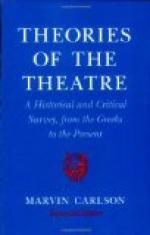And in estimating the work of new and unknown authors, it is not nearly so important for the critic to consider their present technical accomplishment as it is for him to consider the sincerity with which they have endeavored to tell the truth about some important phase of human life. Dramatic criticism of an academic cast is of little value either to those who write plays or to those who see them. The man who buys his ticket to the theatre knows little and cares less about the technique of play-making; and for the dramatist himself there are no ten commandments. I have been gradually growing to believe that there is only one commandment for the dramatist,—that he shall tell the truth; and only one fault of which a play is capable,—that, as a whole or in details, it tells a lie. A play is irretrievably bad only when the average theatre-goer—a man, I mean, with no special knowledge of dramatic art—viewing what is done upon the stage and hearing what is said, revolts instinctively against it with a feeling that I may best express in that famous sentence of Assessor Brack’s, “People don’t do such things.” A play that is truthful at all points will never evoke this instinctive disapproval; a play that tells lies at certain points will lose attention by jangling those who know.
The test of truthfulness is the final test of excellence in drama. In saying this, of course, I do not mean that the best plays are realistic in method, naturalistic in setting, or close to actuality in subject-matter. The Tempest is just as true as The Merry Wives of Windsor, and Peter Pan is just as true as Ghosts. I mean merely that the people whom the dramatist has conceived must act and speak at all points consistently with the laws of their imagined existence, and that these laws must be in harmony with the laws of actual life. Whenever people on the stage fail of this consistency with law, a normal theatre-goer will feel instinctively, “Oh, no, he did not do that,” or, “Those are not the words she said.” It may safely be predicated that a play is really bad only when the audience does not believe it; for a dramatist is not capable of a single fault, either technical or otherwise, that may not be viewed as one phase or another of untruthfulness.
XI
THE EFFECT OF PLAYS UPON THE PUBLIC
In the course of his glorious Song of the Open Road, Walt Whitman said, “I and mine do not convince by arguments, similes, rhymes; we convince by our presence”; and it has always seemed to me that this remark is peculiarly applicable to dramatists and dramas. The primary purpose of a play is to give a gathered multitude a larger sense of life by evoking its emotions to a consciousness of terror and pity, laughter and love. Its purpose is not primarily to rouse the intellect to thought or call the will to action. In so far as the drama uplifts and edifies the audience, it does so, not by precept or by syllogism, but by emotional suggestion. It teaches not by what it says, but rather by what it deeply and mysteriously is. It convinces not by its arguments, but by its presence.




